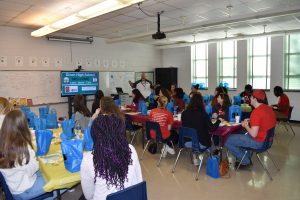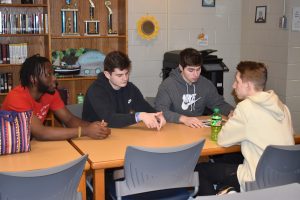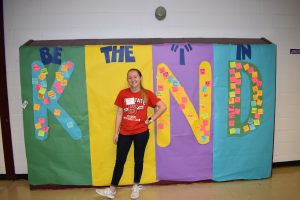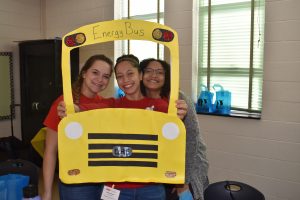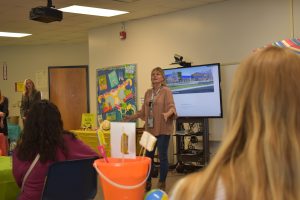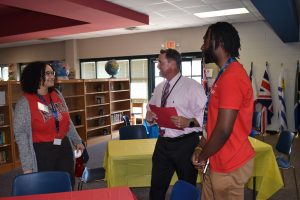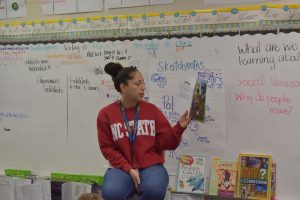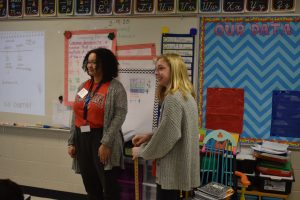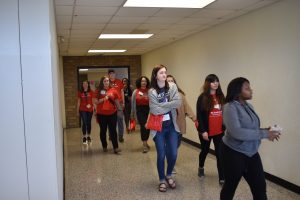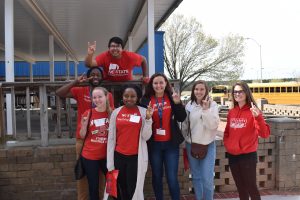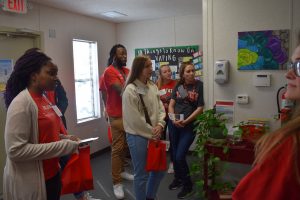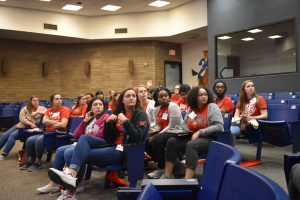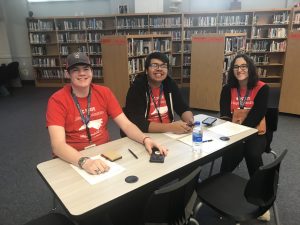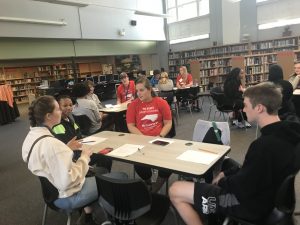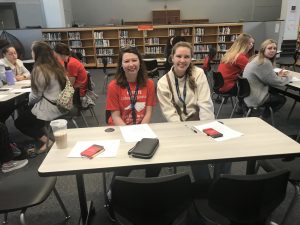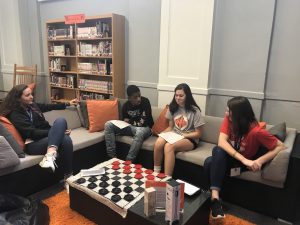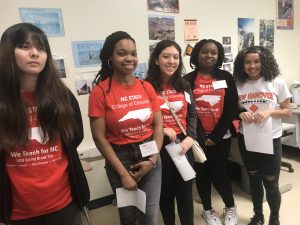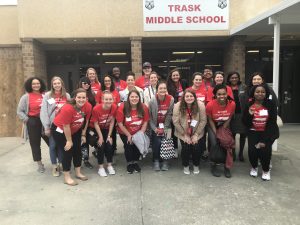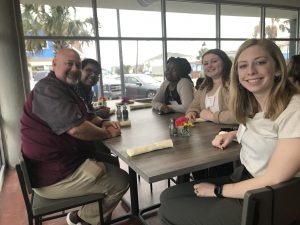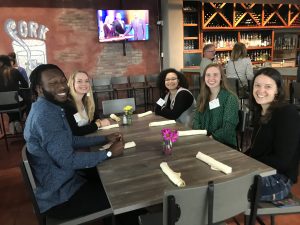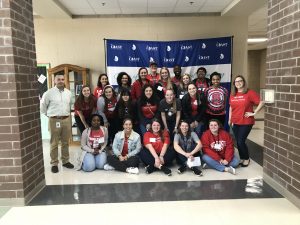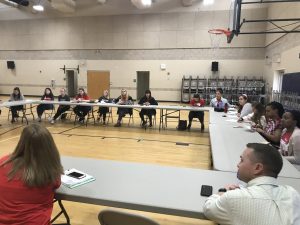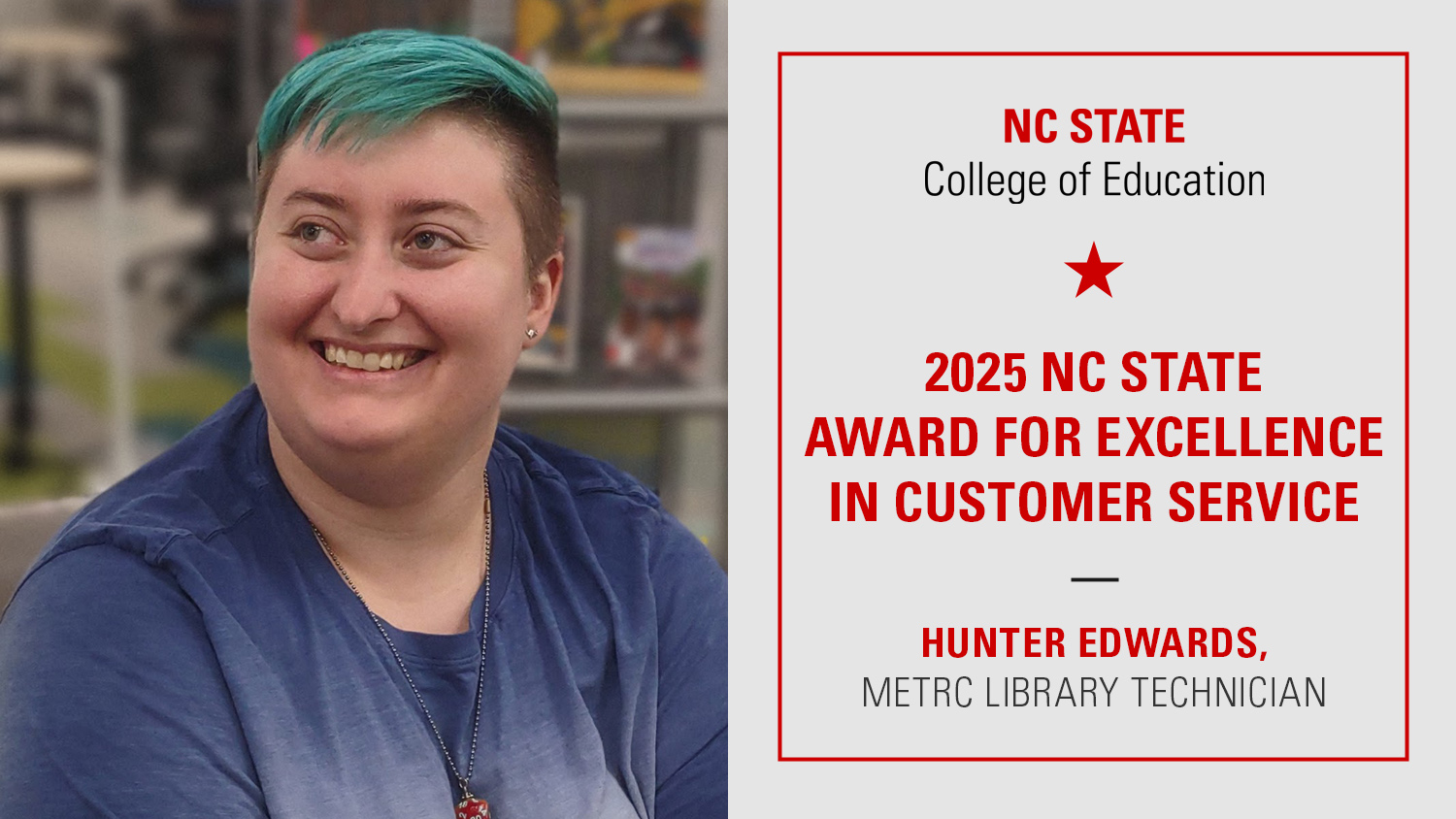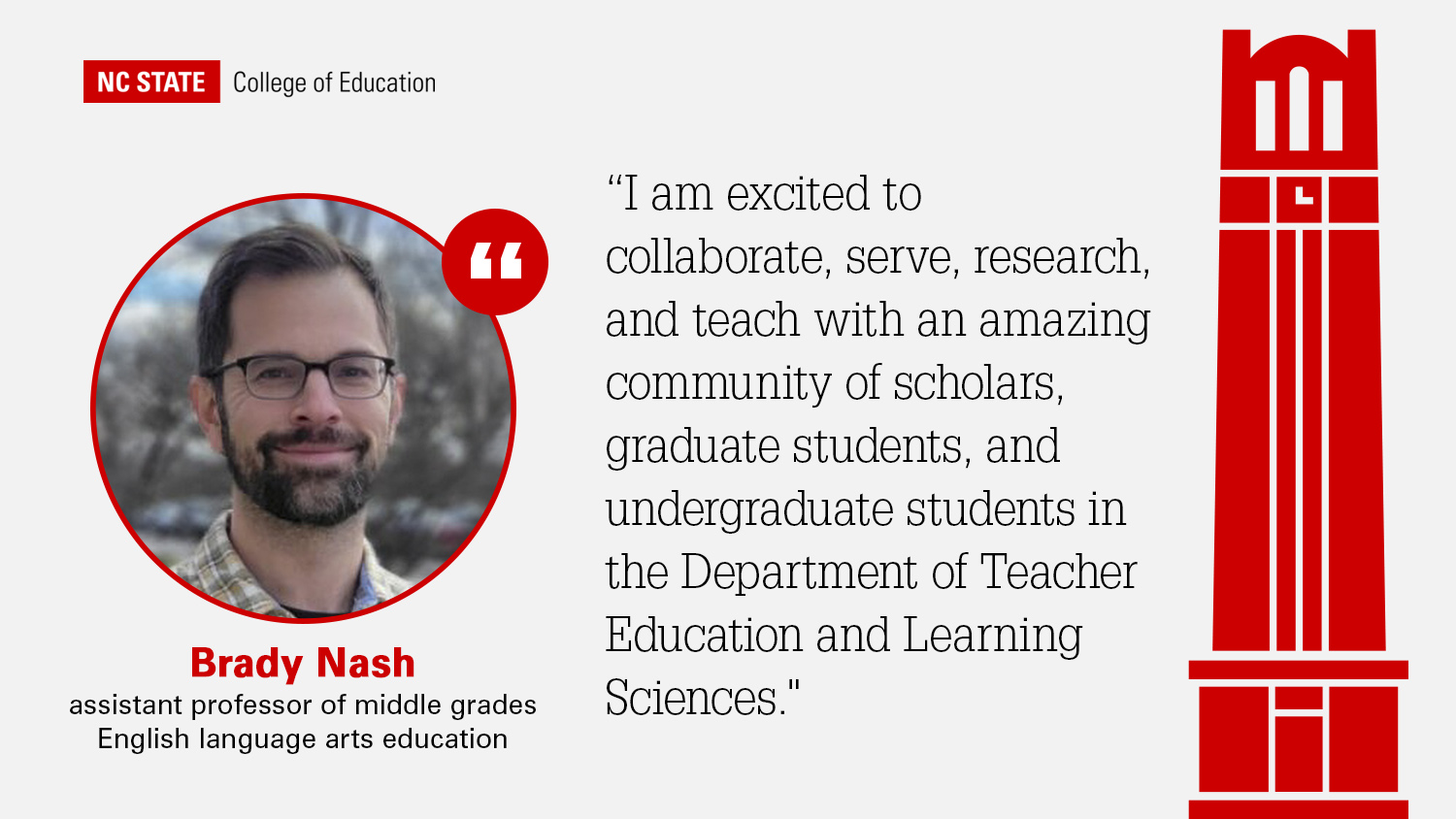My Student Experience: 21 NC State College of Education Students Travel to Eastern North Carolina as Part of We Teach for NC Spring Break Trip
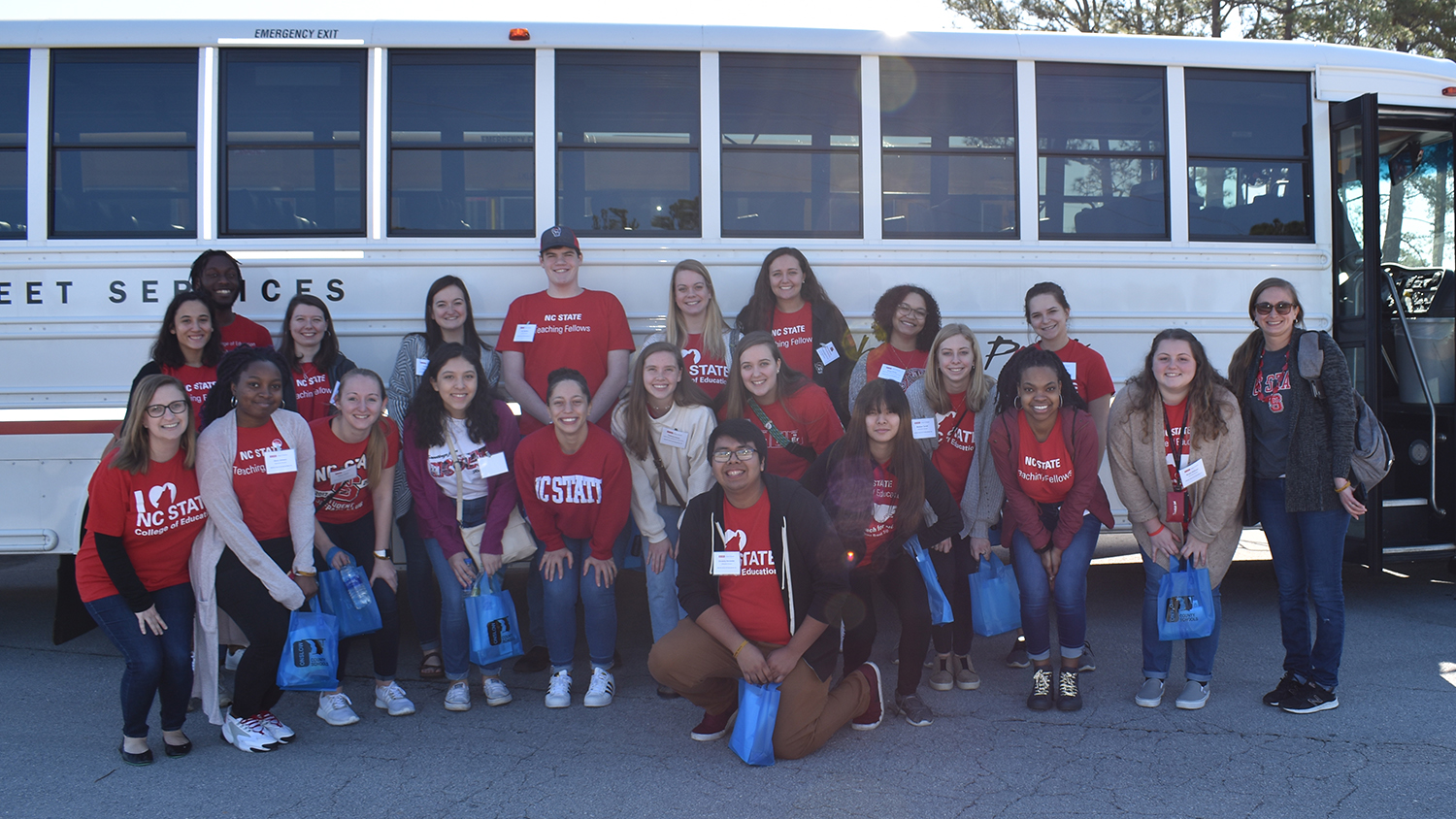
This is part of a monthly “My Student Experience” series in which the NC State College of Education highlights the student experience through profiles, stories and videos.
Twenty-one undergraduate students from the NC State College of Education spent part of their Spring Break in Eastern North Carolina touring schools, observing classrooms and meeting with administrators as part of the college’s We Teach for NC Spring Break Trip.
“We Teach for NC is a cultural immersion trip that engages NC State students in high-poverty, low-performing schools in rural areas of North Carolina,” said Crystal Espey ‘11, ‘18MSA, teaching fellows coordinator. “This program allows education students to explore and appreciate the culture, socio-economic and educational patterns particular to that region of the state.”
The group traveled to Brunswick, New Hanover, Onslow and Pender counties, where they toured elementary, middle and high schools, attended panel sessions with students and teachers, assisted with classroom assignments, interacted with district representatives, school administrators and teachers, and shared their college experiences with high school students.
“This experience has been awesome and I haven’t experienced anything like this before,” said Morgan Bellanger ‘21, a mathematics education major. “I would recommend this trip to other people who are in the College of Education.”
“The We Teach for NC trip provides our students with a chance to see what classrooms in rural North Carolina look like — both the good and the bad — and can hopefully encourage them to consider working in these areas in the future,” said Whitney Richardson White, Ph.D, program manager for strategic outreach and special initiatives. “Even if our students decided that they’d like to stay in a more urban/suburban setting after graduation, understanding the needs of rural communities will assist in their understanding of equitable education for all students.”
[marketing-quote color=’indigo’ align=’left’ img=” source=’Morgan Bellanger ‘21, Mathematics Education’ quotes=’true’]This experience has been awesome and I haven’t experienced anything like this before. I would recommend this trip to other people who are in the College of Education.[/marketing-quote]
DAY ONE
Onslow County
The trip started in Onslow County, where the group visited with teachers and administrators at Dixon High School and Dixon Elementary School. Steve Clarke, principal of Dixon High School, welcomed the group with snacks before sharing a bit about his school and their mission to “Love, Serve, Care.” Students were then divided into groups for a school tour.
“Having College of Education students come down and experience a high school in Onslow County is important because we get to show off what we’ve got going on in Onslow County, specifically, at Dixon High School,” Clark said. “It’s a great opportunity for us to not only show off what we’re doing, but also recruit. Hopefully some folks will walk away from our campus and they’ll want to come back and be a teacher at Dixon High School and in general, Onslow County Schools.”
On the tour, students visited various classrooms where they were able to talk with teachers and ask questions. They also stopped in the media center where an 11th grade English class was trying their hands at solving breakout boxes. The group was able to interact with the students as well as ask questions of the teachers and other staff members.
The morning continued with a trip to Dixon Elementary School, a Leader in Me and Global Ready school with 1,153 students in K-5, where students lined the halls and greeted the group with a song. The group also heard from school administrators and the 2017-18 North Carolina Teacher of the Year Lisa Godwin, a kindergarten teacher at Dixon.
We Teach for NC participants were then divided and placed in various grade levels for classroom assistance and instruction. Student ambassadors from various grades and classes escorted the We Teach for NC students to their rooms. Some members of the group were given one-on-one time with administrators and school district leaders.
“I’ve never been to a school like either of these two, as far as the high school being very emotionally driven and really embracing the theme of love, serve, care. It’s very different in a good way,” said Bellanger. “And then being at a global school, I’ve never seen or heard of one before and so it’s very interesting to see that each classroom has a different country that they study and the kids are learning Chinese in kindergarten.”
The group gathered together for lunch from Salty Sistas Taco Bar before heading about an hour down the road to Pender County.
Pender County
The next stop on the journey was Pender High School in Burgaw, N.C., where the group was greeted by several school administrators. Pender County Schools Superintendent Steven Hill welcomed and addressed the group before turning it over to Principal Caroline Godwin, who introduced a panel of students and teachers from the school.
Panel participants answered questions from a moderator before the We Teach for NC students were able to ask questions. Following the panel, the group was divided up for a school tour, which was led by high school students from the panel. The school tour concluded with snacks, a presentation from Adrianna Johnson with the College Advising Corps and a question and answer session with Godwin and two administrators from the Pender County school district.
That concluded the first day of the We Teach for NC Trip as the group headed another hour down the road to New Hanover County to settle in for the eventing and prepare for dinner.
DAY TWO
New Hanover County
The We Teach for NC group started the second day of their journey at New Hanover High School in Wilmington, where they were welcomed by district representatives and principals who shared insight on New Hanover County Public Schools. They were then greeted by student leaders who divided them into groups for a school tour and classroom visits.
A unique part of the day was the opportunity to spend time with students in the Striving to Achieve Excellence (STAE) program. NC State students met collaboratively with students in STAE, where they discussed career options, high school and college life, and shared best practices for teachers from a student perspective.
STAE classes are designed for students needing extra support. The classes provide students with academic support, social support, career support, college support and leadership development. Students participate in collaborative support groups and enrichment and motivational activities, visit colleges in North Carolina and have guest speakers from the community in an effort to help students realize that college and future careers are attainable.
After lunch, the group headed to Trask Middle School, where they were greeted by the principal and several teachers. The visit started with a student panel, where the We Teach for NC students had the opportunity to ask questions. Panelists shared their thoughts on great teachers and their school. Following the panel, student leaders led the group on a tour. The students were able to help with classroom instruction and observed best practices and technology integrated for classroom lessons.
The day ended with a trip to the NC Battleship and dinner with NC State College of Education Associate Dean for Student Success and Strategic Community Engagement Anona Smith Williams, Ph.D., and district representatives, teachers and administrators from Onslow, Brunswick and New Hanover counties, giving the students an opportunity to talk, discuss various positions and ask questions in a more casual and comfortable environment.
DAY THREE
Brunswick County
The third and final day of the trip was spent in Brunswick County at the Center of Applied Science and Technology (COAST), where the students were able to see a variety of courses that are offered, such as clean energy, carpentry and cybersecurity.
COAST serves all Brunswick County high schools and offers a diverse and dynamic set of classes focused on STEM and technical skills. The classes offer students an opportunity to receive hands-on training in a variety of educational and career fields. Students attend two class periods in either the morning or afternoon with bus transportation provided back to their high schools.
NC State students spent the day observing classes and had the opportunity to visit COAST’s Ninth Grade Academy, a program designed to support students who are not academically ready for the traditional high school experience. They offer smaller class sizes and foundational academic supports in order to encourage each student to have a successful ninth grade year.
“The ultimate goal of this program is to grow the pipeline of highly-qualified educators to rural and high-poverty school districts,” Espey said. “We know that immersion experiences in conjunction with existing partnerships are critical to engaging College of Education students as they consider the many options they have for teaching positions.
Espey believes that We Teach for NC can impact the students’ decisions and result in more NC State College of Education graduates choosing to work in rural and high poverty areas.
“I hope that our students are able to see the difference they can make in the lives of their future students by building relationships and having a positive outlook on the teaching profession,” White said. “There are so many times that our students hear negative commentary about their career choice, and I want them to see firsthand that their job matters. Whether they work in a city like Raleigh or a small town like Bolivia, they are making a difference every day by showing up and meeting the needs of their students.”
[marketing-quote color=’blue’ align=’center’ img=” source=’Whitney Richardson White, Ph.D, Program Manager for Strategic Outreach and Special Initiatives’ quotes=’true’]There are so many times that our students hear negative commentary about their career choice, and I want them to see firsthand that their job matters. Whether they work in a city like Raleigh or a small town like Bolivia, they are making a difference every day by showing up and meeting the needs of their students.[/marketing-quote]
- Categories:
